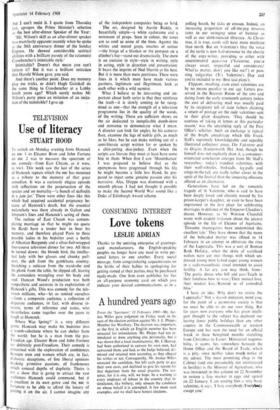Love tokens
CONSUMING INTEREST LESLIE ADRIAN
Thanks to the untiring enterprise of greetings- card manufacturers, the English-speaking peoples no longer have any need to write per- sonal letters to one another. Every social message, from congratulating acquaintances on the births of their babies to apologising for getting stoned at their parties, may be purchased ready-made. One firm even publishes for fun an all-purpose economy card on which you indicate your desired communications, as in a - polling booth, by ticks or crosses. Indeed, an increasing proportion of off-the-peg missives cater to our swinging sense of humour as well as our sloth-induced illiteracy. At Christ- mas, it is true, cards still have more mistletoe than mirth. But on Valentine's Day the voice of the turtle is now half-drowned by the chortle of the copy-writer, providing us either with unsentimental agaceries ('Valentine, you're always sweet, respectful and considerate/ What'sa matter, don't you like me?') or pun- ning vulgarities ('It's Valentine's Day and you're included in my/ Best laid plans').
Flippant, insulting, even cruel valentines are
by no means peculiar to our age. Letters pre- served in the Records Room of the GPO and dating from the early nineteenth century (when the cost of delivering mail was usually paid by its recipient) tell of irate fathers claiming a return of postage on the rude valentines sent to their plain daughters. 'They should be cautious of taking in letters at this particular season,' was the unyielding reply of the Post Office's solicitor. Such an exchange is typical of the bright anecdotage which fills Frank Staff's supremely knowledgeable and superbly illustrated collectors' piece, The Valentine and its Origins (Lutterworth 70s). And, though he himself does not explicitly draw it, a consumer- orientated conclusion emerges from Mr Staff's researches: today's trendiest valentines, with their wolf-whistles, bird-calls, leg-pulls and stings-in-the-tail, are really rather closer to the spirit of the festival than the simpering effusions offered as an alternative.
Generations have fed on the romantic tragedy of St Valentine, who is said to have been deeply loved and chastely moved by his prison-keeper's daughter, or even to have been imprisoned in the first place for celebrating marriages in defiance of the Emperor Claudius's decree. However, as Sir Winston Churchill wrote with evident irritation about the juiciest episode in the life of Eleanor of Aquitaine, `Tiresome investigators have undermined this excellent tale.' They have shown that the name of the beheaded martyr was affixed to 14 February in an attempt to obliterate the rites of the Lupercalia. This was a sort of Roman Bank Holiday, when the skins of sacrificed wolves were cut into thongs with which un- dressed young men lashed eager young women in a sado-masochistic ritual intended to assist fertility. A far cry, you may think, from: 'The pretty doves who bill and coo/Teach in their fondness how to woo;/Their mutual love, their modest kiss,/ Remind us of connubial, bliss.'
I have an idea. Why don't we revive the Lupercalia? Not a slavish imitation, mind you; for the point of a permissive society is that we must be able to do our own thing. But for years now everyone who has given intelli- gent thought to the subject has deplored our having fewer public holidays than any other country in the Commonwealth or western Europe and has seen the need for an official break in these benighted months stretching from Christmas to Easter. Ministerial responsi- bility, it seems, lies somewhere between the Home Office and the Board of Trade, which is a pity, since neither takes much notice of my advice. The most promising chap in the Cabinet (and one presumably not uninterested in fertility) is the Minister of Agriculture, who was instructed in this column on 22 November
a
to restore a free market in eggs and agreed on 22 January. I am sending him a very basic valentine; it says, 'I hate everybody/Everybody except you.'


































 Previous page
Previous page